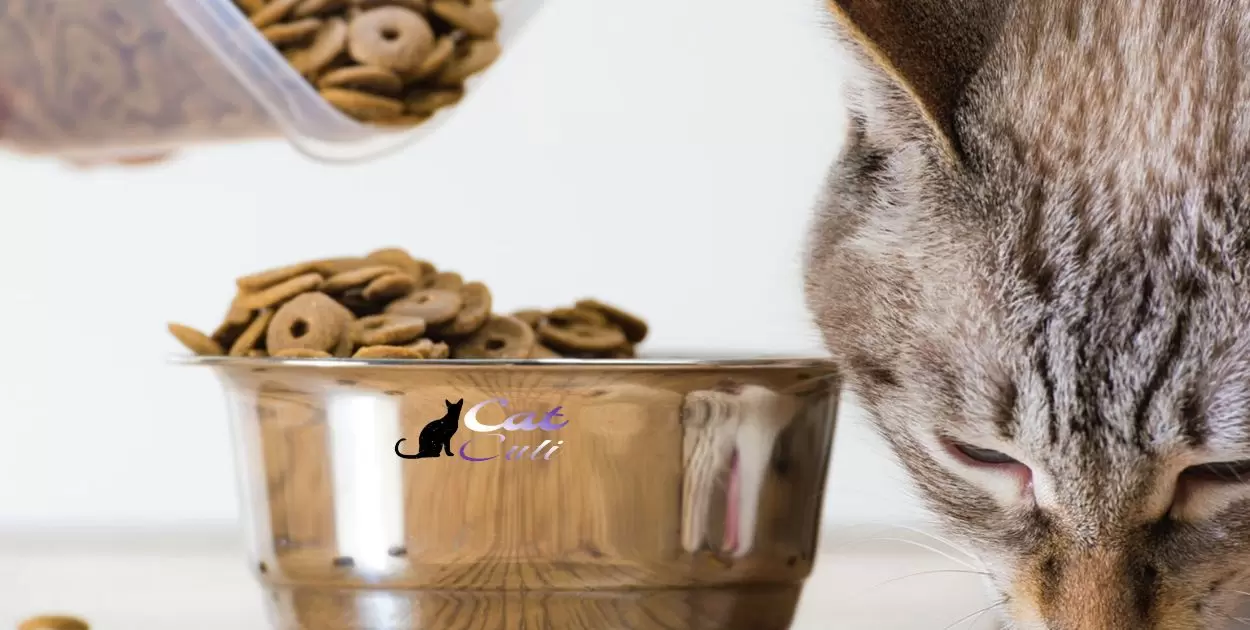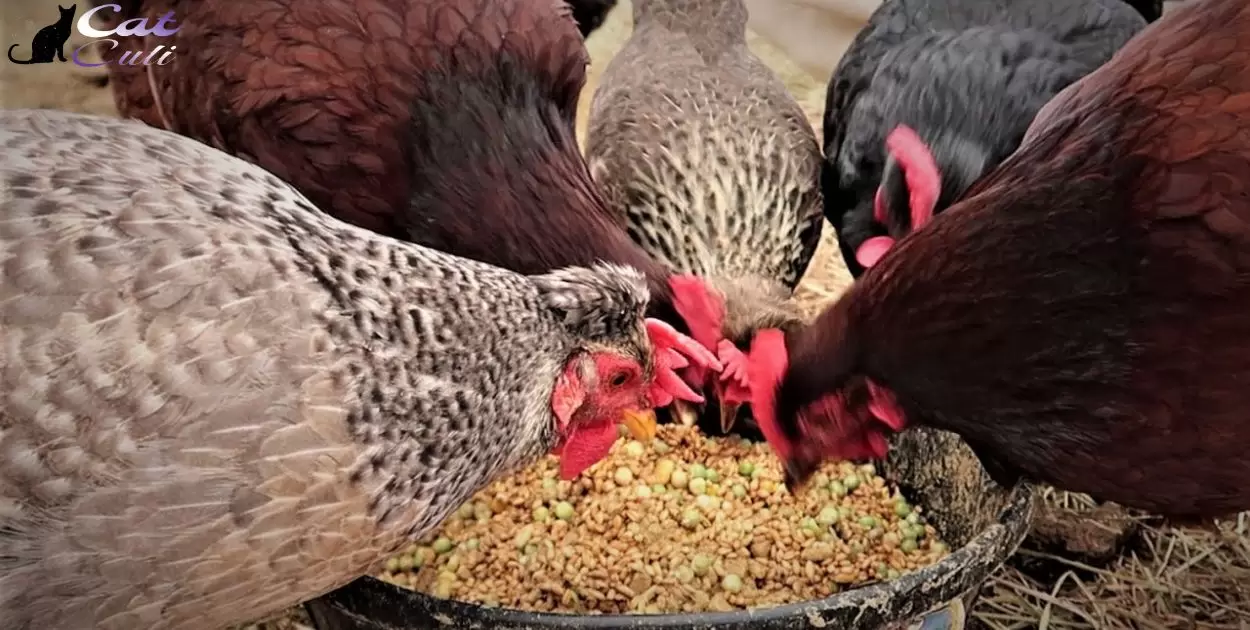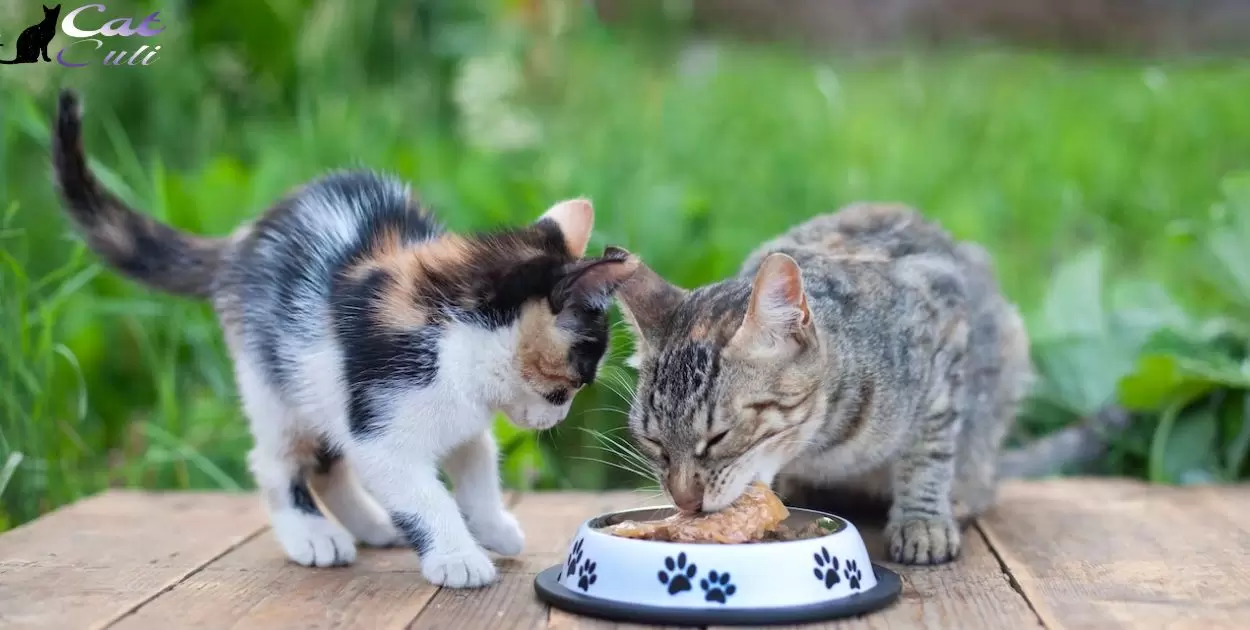Feeding chickens cat food involves providing feline-formulated food to poultry, which might contain protein sources suitable for both cats and chickens. However, it’s important to offer a balanced diet to chickens to ensure they receive necessary nutrients for their health.
Curious about the best diet for your chickens? Wondering, ‘Can I feed chickens cat food?’ Discover the surprising answer and learn how this unique feeding approach might impact your poultry’s health. Explore the do’s and don’ts of incorporating cat food into your chickens’ diet for a balanced and thriving flock!
Feeding chickens cat food can be done occasionally, but it’s not an ideal primary diet. Cat food lacks essential nutrients chickens need, so it’s crucial to supplement their diet with proper poultry feed to ensure their overall health and egg production.
Can Chickens Eat Wet Cat Food
Chickens can eat wet cat food. However, it’s important to remember that chickens need a balanced diet, so cat food should only be an occasional treat. Feeding them too much can lead to health issues because cat food contains different nutrients than what chickens require.
Introducing wet cat food in small amounts can offer extra protein and some essential nutrients to chickens. Yet, their main diet should consist of grains, seeds, vegetables, and a formulated feed specific to poultry. Always ensure that the cat food doesn’t replace their primary nutritional needs for optimal health and egg production in chickens.
Understanding Chicken Nutrition Needs
Chickens need a balanced diet to stay healthy. Their nutrition relies on proteins, vitamins, and minerals. Protein helps with growth, feathers, and egg production. Vitamins like A and D are essential for their health, while minerals such as calcium aid in forming strong eggshells.
Feeding chickens a mix of grains, seeds, and supplements is crucial. It’s vital to provide a diverse diet to meet their nutritional requirements. Ensuring access to clean water at all times is equally important. Understanding their needs helps maintain their health and productivity, ensuring happy and thriving chickens.
Risks of Feeding Chickens Cat Food
Feeding chickens cat food poses dangers to their health. Cat food contains high protein levels that exceed the nutritional needs of chickens. Excessive protein can harm chickens’ kidneys and lead to health issues.
Cat food lacks essential nutrients vital for chickens. The imbalance in nutrients may cause deficiencies, affecting their growth and egg production. Feeding chickens cat food increases the risk of health problems and should be avoided to maintain their well-being. If you are seeking suitable food options for your chickens, it is essential to explore feeds specifically formulated for poultry. Utilizing an EBT card for purchasing quality chicken feed ensures that you provide your birds with the necessary nutrients for optimal health and productivity.
Differences in Cat and Chicken Diets
| Aspect | Cat Diet | Chicken Diet |
| Protein Content | High, tailored for carnivorous needs | Moderate, balanced for omnivorous diet |
| Nutrient Composition | Rich in animal-based proteins and fats | Balanced mix of proteins, carbs, and fats |
| Taurine Requirement | Essential amino acid; necessary for cats | Not essential; chickens can synthesize it |
| Vitamin Requirements | Need specific vitamins like A and D | Need vitamins like B12, K, and E |
| Calcium Source | Derived from bones and meat | Obtained from feeds, greens, and supplements |
| Fiber Intake | Low, minimal fiber requirements | Higher, needed for digestive health |
This table highlights the key differences in dietary needs between cats and chickens, emphasizing their distinct requirements for proteins, nutrients, vitamins, and sources of essential elements like calcium and fiber.
Potential Health Impacts on Chickens
The health of chickens can be affected by various factors. Poor diet, lack of clean water, and overcrowded living conditions might lead to stress and diseases among them. This stress can weaken their immune systems, making them more prone to illnesses.
Exposure to contaminated environments or inadequate shelter can make chickens susceptible to infections. Regular veterinary care, proper nutrition, and ensuring a clean and spacious environment are crucial to maintaining their health.
Cat Food Ingredients and Their Effects
Cat food contains various ingredients. These can impact your cat’s health. Some ingredients might cause allergies or digestive issues. Others promote good health and vitality.

Proteins like chicken or fish benefit cats. They aid in muscle development and energy. However, artificial additives might trigger allergies. Checking labels helps identify beneficial ingredients. Healthy choices ensure your cat stays happy and healthy.
Protein Requirements for Chickens
Chickens need protein to grow and stay healthy. Their protein needs vary based on their age and purpose—whether for egg-laying or meat production. Young chicks require higher protein levels, around 18-20%, for proper development.
As chickens mature, their protein needs change. Layers, which lay eggs, benefit from about 16% protein in their diet. However, broilers, raised for meat, require a higher protein content, around 20-24%, to support rapid growth and muscle development. Providing the right amount of protein is crucial for optimal chicken health and productivity.
Why Do Chickens Like Cat Food
Chickens enjoy cat food because of its high protein content. The proteins in cat food resemble the insects and bugs chickens naturally eat. These nutrients aid in their growth and provide necessary energy. Chickens also find the taste appealing, making cat food a tasty treat for them.
The smell of cat food attracts chickens due to its strong scent. They’re drawn to the aroma, finding it enticing and interesting. The combination of protein-rich content and an appealing smell makes cat food an occasional favorite among chickens, despite it not being their primary diet.
Impact of Cat Food on Egg Quality
Cat food affects egg quality in hens. The nutrients in cat food, if given to hens, influence the nutritional composition of their eggs. This change can affect the taste and health benefits of the eggs consumers eat.
The quality of eggs depends on what hens eat. Cat food alters the eggs by changing their nutritional content. This can impact how nutritious and flavorful the eggs are for people who consume them.
Balancing Chicken Diets Appropriately
Balancing chicken diets is vital for their health. Chickens need a mix of grains, protein, and vitamins. Farmers must plan diets carefully to ensure chickens get the nutrients they need. A balanced diet promotes growth and strong egg production.
Properly balanced diets prevent health issues. Imbalanced diets can lead to deficiencies and diseases. Farmers adjust feed compositions based on chicken age and purpose. Keeping diets balanced ensures chickens lead healthy lives.
Alternatives to Cat Food for Chickens
Chickens can eat more than just traditional feed. Several alternatives exist for chicken diets beyond cat food. Fruits, vegetables, and grains make great options.
Offering chickens a diverse diet is beneficial. They can enjoy scraps like lettuce, corn, or even oatmeal. These alternatives supplement their nutrition and keep them healthy and happy.
Can I Feed Chickens Cat Food Or Chickens
Feeding chickens cat food isn’t ideal. Chickens require specific nutrients found in poultry feed, not present in cat food. Cat food lacks essential components vital for a chicken’s growth and health, like adequate protein levels and certain vitamins. Opt for a balanced diet formulated for poultry to keep chickens healthy and thriving.

Chickens can eat other foods, like fruits, vegetables, and grains. However, it’s crucial to avoid foods harmful to them, like chocolate or spoiled food. Providing a diverse diet alongside proper poultry feed ensures your chickens get the necessary nutrients for a healthy life.
Feasibility of Occasional Cat Food Feeding
Feeding your cat occasional human food can be okay, but it needs careful consideration. Cats are obligate carnivores, so their diet primarily consists of meat. Offering human food occasionally, like cooked chicken or fish, can be safe if it’s plain and boneless. However, avoid ingredients like onions, garlic, or spices, as they can harm your cat.
Introducing new foods must be gradual to prevent digestive issues. Monitor your cat for any adverse reactions after trying new food. Always consult your veterinarian to ensure the occasional addition of human food aligns with your cat’s specific dietary needs and health conditions.
Risks of Overfeeding Cat Food to Chickens
Feeding cat food to chickens poses dangers. The high protein in cat food can harm chickens. Excess protein leads to kidney problems in chickens. This can affect their health negatively.
Cat food lacks essential nutrients for chickens. It’s not formulated for their needs. Overfeeding cat food causes imbalances in their diet. This might lead to deficiencies impacting their overall wellbeing.
Managing Chicken Diet Diversity
Managing a chicken’s diet involves balancing various foods. A diverse diet keeps them healthy and happy. Including grains, vegetables, and proteins ensures they get necessary nutrients. Changing their food gradually helps them adjust easily.
Avoid feeding only one type of food to chickens. Diversity in their diet prevents nutrient deficiencies. Monitor their reactions to new foods for any adverse effects. This way, you ensure their diet is varied and beneficial.
Veterinary Perspectives on Cat Food for Chickens
Veterinarians suggest that cat food for chickens can be harmful. They warn that it might lack essential nutrients. Chickens require specific diets to stay healthy.
Experts advise against using cat food for chickens regularly. They emphasize the importance of providing them with proper feed. Veterinarians recommend consulting them for suitable chicken diets.
Impact of Cat Food on Chicken Digestion
Here are five benefits related to the impact of cat food on chicken digestion:
- Digestive Health: Cat food may upset the natural balance in a chicken’s digestive system, affecting their health.
- Nutritional Imbalance: Using cat food can lead to nutritional deficiencies in chickens, impacting their overall well-being.
- Digestive Efficiency: Understanding the impact helps farmers optimize chicken diets for better digestion and nutrient absorption.
- Health Monitoring: Recognizing the effects allows farmers to monitor chicken health and adjust their diets accordingly.
- Productivity: Properly managing the impact of cat food on chicken digestion can enhance egg production and poultry growth.
Potential Allergies or Sensitivities in Chickens
Chickens might have allergies or sensitivities. These reactions could be to food, bedding, or environmental factors. Common signs include itchiness, sneezing, or diarrhea.
Identifying triggers is crucial. Changing feed or bedding might help. Consulting a vet can pinpoint specific allergies. Monitoring chickens closely aids in managing potential sensitivities.
Long-term Effects of Cat Food Consumption
Cat food consumption can affect cats’ health over time. Some potential long-term effects include obesity and nutritional deficiencies. These issues may arise due to an imbalanced diet or overeating.
Consistent consumption of certain cat foods might lead to digestive problems. Cats might also develop allergies or intolerances to specific ingredients in their food. Monitoring their diet and choosing balanced, high-quality cat food can help prevent these long-term effects.
Optimal Nutritional Balance for Poultry
Poultry cat food needs a perfect mix of nutrients for your cat’s health. The right balance of proteins, vitamins, and minerals keeps cats lively and healthy. Cats thrive on diets with real poultry for essential proteins and a healthy coat.
A balanced diet ensures your cat gets the necessary nutrients. Proteins from poultry help muscles grow strong. Essential vitamins and minerals support a robust immune system for a happy, active cat. Balanced nutrition means a happy, healthy feline friend.
Adjusting Chicken Diets for Optimal Health
To ensure chickens stay healthy, farmers adjust their diets. They do this by choosing feeds rich in nutrients. These feeds help chickens grow strong and prevent diseases. Farmers consider factors like protein and vitamins when planning diets. This keeps the chickens in top shape, ensuring they lay quality eggs and grow well.
A balanced diet for chickens involves various ingredients. Corn, soybean meal, and supplements make up their meals. Farmers monitor the chickens’ health to fine-tune their diets. This practice helps them thrive and ensures the best quality poultry products.
Evaluating Risks and Benefits for Chickens
- Health Monitoring: Regular evaluation of risks and benefits helps maintain chicken health. It allows farmers to spot potential issues early and take preventive measures, ensuring the flock stays healthy.
- Optimized Nutrition: Assessing risks and benefits aids in optimizing chicken diets. Farmers can adjust feed components to maximize nutritional benefits while minimizing potential risks, ensuring the birds receive the best nutrition.
- Disease Prevention: Evaluating risks helps in preventing diseases among chickens. Identifying potential hazards allows for implementing measures that reduce the likelihood of infections or illnesses, ensuring a healthier flock.
- Product Quality: By evaluating risks and benefits, farmers can enhance the quality of chicken products. This process ensures that eggs and meat meet quality standards, satisfying consumer expectations.
- Economic Efficiency: Assessing risks and benefits contributes to the economic efficiency of chicken farming. It minimizes unnecessary costs associated with risks while maximizing the benefits, leading to a more profitable operation.
Wet Or Dry Cat Food For Chickens
Chickens prefer dry cat food over wet varieties. Dry cat food provides them with necessary nutrients and is easier for them to peck and digest. The crunchy texture of dry cat food also aids in keeping their beaks trimmed.
While some chickens might eat wet cat food, it’s not ideal for their digestion. Wet food can become messy and spoil quickly, potentially causing health issues for the chickens. Opting for dry cat food ensures better nutrition and easier handling for your feathered friends.
Can Chickens Eat Cat Food Or Dog Food
Chickens shouldn’t eat cat food or dog food. These foods aren’t suitable for their diet. Chicken feed, grains, and veggies are better for their health. Introducing unfamiliar foods might upset their stomachs.
Cat food has ingredients chickens shouldn’t eat. Dog food has different nutrients not ideal for chickens. Stick to chicken-specific diets for their well-being. Introducing other pet foods might cause digestive issues.
Frequently Asked Question
Is it safe to give chickens cat food?
It’s not safe to give chickens cat food. Chickens need their specific diet for proper health and cat food isn’t suitable for them.
What is the best food for chickens?
The best food for chickens is a balanced diet of chicken feed, grains, and fresh vegetables. This combination provides essential nutrients for their health and egg production.
What can I feed my chickens to increase protein?
You can feed your chickens mealworms or soybeans for more protein. These are natural sources that boost their protein intake.
Is chicken in cat food good?
Chicken in cat food can be nutritious for cats. It provides protein and essential nutrients they need.
Conclusion
Feeding chickens cat food isn’t recommended. While they might eat it, cat food doesn’t fulfill their dietary needs. Optimal chicken diets consist of grains, seeds, and proteins specifically formulated for their health. Introducing cat food may cause nutritional imbalances and digestive issues in chickens, making it unsuitable for their well-being.
Feeding chickens cat food isn’t advisable. Chickens require a balanced diet rich in nutrients that cat food doesn’t provide. To ensure the best health for your chickens, stick to appropriate feeds designed explicitly for their dietary requirements, steering clear of cat food.








